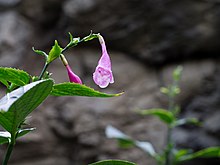Strobilanthes cusia, also known as Assam indigo or Chinese rain bell, is a perennial flowering plant of the family Acanthaceae.[1] Native to South Asia, China, and Indochina, it was historically cultivated on a large scale in India and China as a source of indigo dye, which is also known as Assam indigo.[2] In addition to being used for dye, it is also used in the traditional Chinese herbal medicine "Qingdai".[3] Other names for this dicot include Pink strobilanthes and Strobilanthes flaccidifolius, where flaccidifolius is Latin for "drooping leaves".[1]
| Strobilanthes cusia | |
|---|---|

| |
| Scientific classification | |
| Kingdom: | Plantae |
| Clade: | Tracheophytes |
| Clade: | Angiosperms |
| Clade: | Eudicots |
| Clade: | Asterids |
| Order: | Lamiales |
| Family: | Acanthaceae |
| Genus: | Strobilanthes |
| Species: | S. cusia
|
| Binomial name | |
| Strobilanthes cusia | |
References
edit- ^ a b "Strobilanthes cusia - Assam Indigo".
- ^ "Strobilanthes cusia - Useful Tropical Plants". tropical.theferns.info.
- ^ Zhang, Libin; Yang, Huizhao; Wang, Yanan; Zhuang, Huifu; Chen, Wenyun; Lin, Zihong; Xu, Jianchu; Wang, Yuhua (2021-10-01). "Blue footprint: Distribution and use of indigo-yielding plant species Strobilanthes cusia (Nees) Kuntze". Global Ecology and Conservation. 30: e01795. Bibcode:2021GEcoC..3001795Z. doi:10.1016/j.gecco.2021.e01795. ISSN 2351-9894. S2CID 239629798.